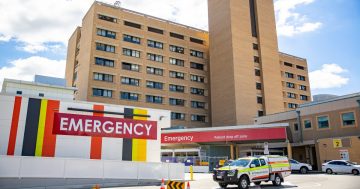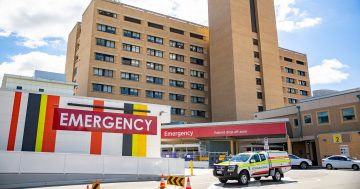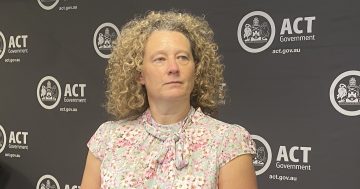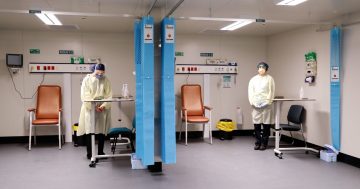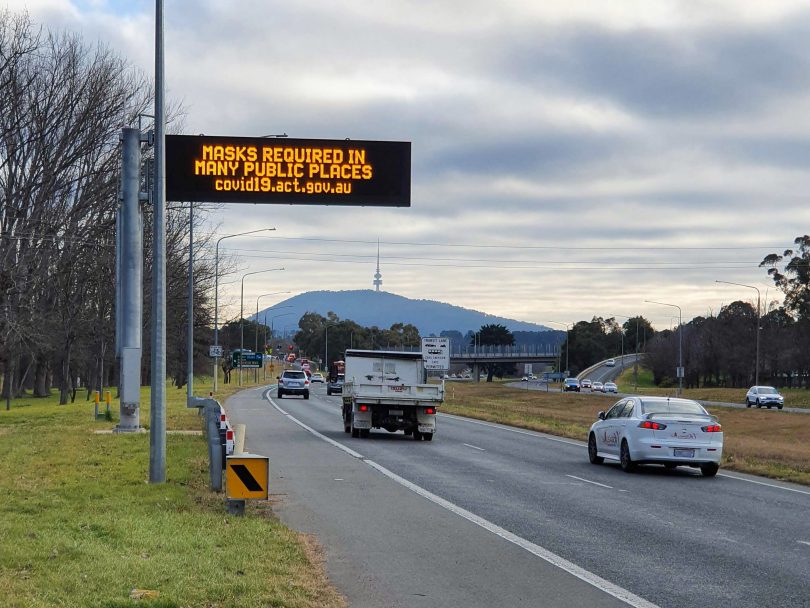
A year without COVID-19 in the ACT has not meant there haven’t been concerns. Photo: Region Media.
It might be hard to believe, but 10 July 2021 marks exactly 365 days since the ACT recorded its last locally acquired case of COVID-19.
ACT Chief Health Officer Dr Kerryn Coleman said she cannot believe the Territory is set to mark this milestone and attributes the ACT’s success to preparation and prevention.
In 365 days a lot has happened, from unsteady vaccination roll-outs, mask mandates, fines for interstate visitors, interstate outbreaks and lockdowns, travel restrictions and requirements for ACT residents.
Throughout it all, COVID-19 has not been far away.
With the current Sydney outbreak continuing to be of concern, Dr Coleman urged Canberrans to remember that the threat of an outbreak is ever-present. At one point in the last few weeks, more than 10,000 Canberrans were subject to stay-at-home orders.
A year with no locally acquired cases doesn’t mean there haven’t been COVID-positives in the ACT. The most recent was in April: a returned diplomat in his 50s tested positive while in quarantine. It also sent three close contacts into isolation.
Other cases in March were in hotel quarantine when they tested positive, most of which had flown into Canberra on the government-facilitated flight from Singapore. The ACT then canned repatriation flights in April 2021, with Health Minister Rachel Stephen-Smith citing significant costs and operational difficulties for the ACT compared to larger jurisdictions.

Health Minister Rachel Stephen-Smith cited high costs as the reason for canning repatriation flights to the ACT. Photo: Michelle Kroll.
And while Canberrans might have lived without COVID-19 outbreaks, the effects of interstate lockdowns and outbreaks are undeniable.
Booking a holiday became something of a lottery – nobody ever sure if they would have to return and quarantine or cancel plans at the last minute.
Over Christmas, travel plans were left in disarray because of Sydney’s Northern Beaches outbreak, and you’d be hard-pressed to find parents who enjoyed the recent school holidays with so many holiday programs cancelled at the last minute.
Throughout the year, there have been various periods in which travel restrictions have been imposed for ACT residents or vice versa between Western Australia (April 2021, February 2021 and October 2020), Victoria (May 2021, February 2021, November 2020) and NSW (June 2021, December 2020 to January 2021), Queensland (March 2021, January 2021), South Australia (November 2020) and Tasmania (October 2020).
According to Dr Coleman, outbreaks in NSW have put the ACT on the highest alert.
“When the Northern Beaches cluster exploded earlier in the year, that was particularly concerning, but currently, with the delta variant that is about 50 per cent more transmissible, if there is a case in the ACT, there will certainly be seeding,” she said.
In August 2020, a Victorian driver attempted to enter the ACT, leading to a high-speed chase with police, while during the same month, confusion over border rules left ACT residents stranded at the border. Over the summer, there were various instances of police setting up checkpoints on the ACT border.
The South Coast ‘outbreak’ between August and September last year put Canberrans on edge, but again, the Territory escaped unscathed.
Also in July 2020, the first ACT restaurant was fined for breaching COVID-19 restrictions.
Canberrans have also become used to, over the last 12 months, ‘checking in’ via an app.
In March 2021, Check in CBR was made mandatory for many businesses – largely hospitality ones. It was recently expanded to include all retail businesses no matter how long a customer might plan to spend in the store, as well as on public transport and rideshare vehicles – a change that will become mandatory from midday on 15 July.
Recently, ACT residents dealt with their first few weeks of mandatory and enforceable mask-wearing. Despite face masks no longer being mandatory (as of midnight last night), the ACT Government continues to encourage their use.
Recently, of course, there were fears that the virus had breached the ACT’s borders. It turned out to be a false-positive.
Developing a vaccine was still a race last July. Now, they are available at GPs and mass vaccination hubs, although changing health advice and a lack of adequate supply has continued to impede the progress of the rollout. Currently, around 155,000 vaccinations have been administered.
Continue to monitor ACT Health COVID-19 for the latest details.












